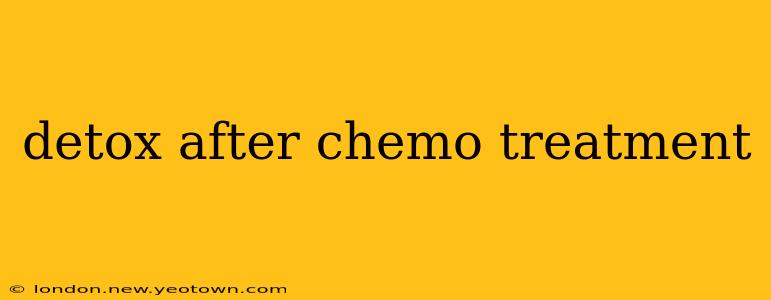Chemotherapy, a powerful weapon in the fight against cancer, can leave its mark on the body. While it effectively targets cancerous cells, it can also damage healthy tissues and organs, leading to a range of uncomfortable side effects. Many cancer survivors feel the urge to “detox” after their treatment, seeking ways to support their bodies in healing and regaining vitality. This isn't about eliminating toxins in a magical way; rather, it's about nurturing your body through a comprehensive approach to recovery. This isn't a quick fix, but a journey toward renewed health and well-being.
What are the common side effects of chemotherapy that people want to address?
Chemotherapy side effects vary widely depending on the type and dosage of drugs used, as well as the individual's overall health. Common side effects prompting a desire for post-chemo support include:
- Fatigue: The overwhelming tiredness experienced by many chemo patients often lingers even after treatment ends.
- Nausea and Vomiting: These are common and distressing side effects, leaving individuals feeling weak and depleted.
- Mouth Sores (Mucositis): Painful sores in the mouth can make eating and drinking difficult, impacting nutrition.
- Constipation or Diarrhea: Changes in bowel habits are common, further contributing to discomfort and nutritional deficiencies.
- Hair Loss: While often temporary, hair loss significantly impacts self-esteem and well-being.
- Cognitive Impairment ("Chemo Brain"): Difficulty concentrating, remembering things, and processing information is a frequently reported side effect.
- Weakened Immune System: Chemotherapy weakens the immune system, making individuals more susceptible to infections.
Does the body need to detox after chemotherapy?
The concept of "detox" after chemo is often misunderstood. Your liver and kidneys, your natural detoxification organs, are already working hard to eliminate the chemotherapy drugs and their byproducts from your system. However, supporting these organs and providing your body with the nutrients it needs to repair and rebuild is crucial for recovery. This is where a holistic, supportive approach comes in, focusing on optimizing your body's natural healing processes.
What are some safe and effective ways to support the body after chemo?
A balanced approach is key. Focus on these strategies to support your body's natural detoxification processes and overall recovery:
-
Nutrition: A balanced diet rich in fruits, vegetables, whole grains, and lean protein is essential. Consult a registered dietitian or oncology nutritionist for personalized guidance. They can help you create a plan that addresses any specific nutritional deficiencies resulting from chemo.
-
Hydration: Drinking plenty of water is crucial to flush out waste products and support kidney function. Electrolyte drinks can help replenish essential minerals lost through nausea, vomiting, or diarrhea.
-
Gentle Exercise: As you regain strength, gentle exercise like walking or yoga can improve circulation, boost energy levels, and reduce fatigue. Always consult your oncologist before starting any new exercise routine.
-
Stress Management: Stress can exacerbate many side effects. Techniques like meditation, deep breathing, yoga, or spending time in nature can help manage stress and promote relaxation.
-
Rest and Sleep: Adequate rest and sleep are vital for the body's repair and regeneration processes. Aim for 7-9 hours of quality sleep per night.
Are there any specific supplements that can help with detox after chemo?
While some supplements might seem appealing, it's crucial to discuss any supplementation with your oncologist or a qualified healthcare professional. Some supplements can interact with chemotherapy drugs or other medications, potentially causing harmful side effects. Never self-medicate. A healthcare provider can guide you on safe and effective supplementation based on your individual needs and health status.
What about alternative therapies like herbal remedies?
Many alternative therapies are touted for detoxification, but their effectiveness in the context of post-chemotherapy recovery is largely unproven. Some herbal remedies can interact negatively with chemotherapy or other medications. It's essential to discuss any complementary therapies with your oncology team to ensure they're safe and won't interfere with your treatment plan.
How can I support my mental well-being after chemo?
The emotional and psychological toll of cancer treatment shouldn't be underestimated. Support groups, counseling, or therapy can provide valuable emotional support and coping mechanisms. Connecting with others who have gone through similar experiences can be incredibly powerful.
Remember, your recovery journey is unique to you. Work closely with your healthcare team to develop a personalized plan that prioritizes your well-being and supports your body's natural healing capabilities. Focusing on a holistic approach that integrates nutritional support, gentle exercise, stress management, and emotional well-being will significantly contribute to your post-chemo recovery. This is not about a quick "detox," but about a sustainable journey towards renewed health and vitality.

